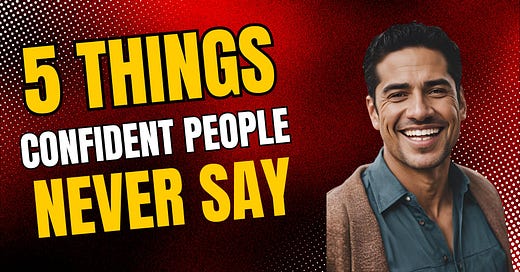I've been a student of personal development for 40 years, and in that time, I've learned that growth is a continuous process. It’s not something that happens overnight, nor is it something you achieve once and never revisit. My journey to increased confidence, both socially and in business, has been a lifelong endeavor, with plenty of bumps along the way.
In my 20s, I embarked on a career in sales—a field that demands a high level of confidence. You have to be willing to approach strangers, engage them in conversation, and ultimately persuade them to invest in your product or service. But when I first started, I was plagued by a nagging sense of self-doubt. The thought that kept running through my mind was, "I'm not good enough." This belief was so deeply ingrained that it affected every interaction I had. When I approached prospects, I would often start with an apology, saying things like, "I'm sorry to bother you," before I even had a chance to introduce myself or my product.
Apologizing for my own presence, my own voice, was a reflection of how little I valued myself at that time. And if I didn’t value myself, how could I expect anyone else to? This mindset was a huge barrier, not just in sales, but in life. I realized that if I wanted to succeed, I needed to shift my perspective.
I spent countless hours (and still do) listening to positive, inspiring audios and videos. I sought out every resource I could find—books, seminars, and mentors who could teach me not just sales techniques, but how to build self-worth from the inside out. These tools were invaluable, but the most significant change came when I decided to stop waiting for confidence to magically appear. I realized that confidence isn't something you wait for; it's something you cultivate through action.
One of the most helpful steps I took was to embrace the philosophy of "just do it," as the Nike slogan goes. I stopped waiting to feel confident and started acting as if I already was. This wasn't easy. The first few times I forced myself to pick up the phone or approach someone in person, I felt a knot in my stomach. My hands would shake, and my voice would sometimes waver. But I did it anyway.
And something amazing happened: The more I pushed myself to get out and talk to people, the more I picked up the phone, the more my confidence grew. Each interaction, whether it ended in success or rejection, was a step forward. I began to see rejection not as a personal failure, but as a natural part of the process. With each "no" I received, I knew I was one step closer to a "yes." Over time, those shaky hands steadied, and my voice grew stronger. I no longer felt the need to apologize for my presence.
So, here’s my best advice to you, whether you’re struggling to approach people socially, like asking someone out on a date, or trying to advance your career: Take the risk of rejection and start talking to people. It will be uncomfortable at first. You might stumble over your words, and you will likely face some rejection. But with persistence, you will have a breakthrough.
Confidence is like a muscle—the more you use it, the stronger it becomes. So, don’t quit. Keep pushing yourself, keep stepping out of your comfort zone, and over time, you’ll find that what once felt impossible becomes second nature. You are more capable than you realize, and the only way to prove that to yourself is to take action, one step at a time.
Here are five things confident people typically avoid saying:
"I can't do that."
- Confident people are more likely to approach challenges with a can-do attitude. Even if they don't know how to do something, they believe in their ability to figure it out or learn.
"I'm not good enough."
- They don't undermine their own abilities or worth. Instead of focusing on perceived shortcomings, they focus on their strengths and how they can improve.
"What will people think?"
- Confident people don't let the fear of judgment dictate their actions. They are more concerned with staying true to themselves and their values.
"I'm sorry for bothering you."
- While they do apologize, when necessary, they don't constantly apologize for taking up space or for their needs. They understand that they have a right to express themselves.
"That's just how it is."
- They don’t accept limitations or excuses at face value. Instead, they challenge the status quo and look for ways to change things for the better.






"What will people think?": This is one of my most repeated line. It's still hard to change this bad habit of mine
Someone once said, “the people that mind don’t matter and the people that matter don’t mind.”